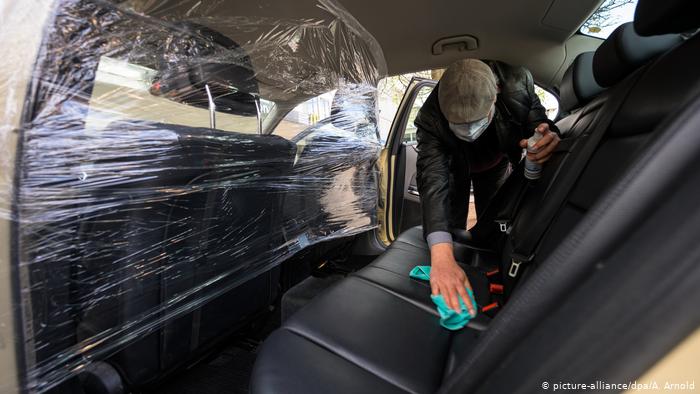Berlin, Germany – Leszek Nadolski couldn’t believe his eyes when he recently pulled into a parking lot near Berlin’s Tegel Airport. Hundreds of taxis and vans filled the lot — all out of service due to a steep drop in demand caused by the coronavirus pandemic.
“I thought to myself: this is terrifying,” Nadolski, who heads the Berlin taxi guild, told DW.
An estimated 3,000 of the nearly 8,000 taxis in Berlin have now been taken out of service. The rest of the vehicles still operating in the German capital aren’t able to make much money under the current circumstances.
Over a 10-hour shift, drivers are earning an average of €50 ($54), Nadolski said, falling well-below Germany’s €9.35 per hour minimum wage.
The situation is “catastrophic,” he said. “We’ve seen a drop in revenue of 80% to 90%.”
Nadolski is not the only one to describe the situation in such drastic terms. In the western German city of Cologne, taxi companies logged “at least an 80% reduction” in business in recent weeks, with over half of the 1,100-vehicle fleet staying home.
Taxis form part of Germany’s local public transportation systems and have a legal obligation to operate unless told otherwise.
“No matter what’s going on outside, no matter what type of disasters, terror attacks or severe weather — you can always rely on taxis. We’ll continue to stay out there and offer our services,” said Aleksandar Dragicevic, spokesman for Cologne’s taxi association.
Adapting to stay afloat
In a bid to offset the financial damage, taxi companies across Germany have started broadening their services.
In Cologne, taxi companies are now offering to pick up groceries or medicine for clients who have already paid for the goods and deliver it to their homes. Taxi drivers can also pick up a customer’s shopping list and money and go shopping for them for a set price.
“We’re trying to help people who aren’t in a position to go shopping,” Dragicevic said.
Taxis in Düsseldorf and Hamburg are also providing similar delivery services for set prices. In Munich, taxis are offering to drive medical workers to work for free to minimize the risk of infection.
Berlin’s taxi guild worked out a deal with the city-state government that allows cab drivers to offer lower prices for grocery and pharmacy deliveries than they would normally charge for a regular passenger fare. They also offer to pick up takeout food from restaurants and other items from shops.
“Most of the people who reach out to us are the elderly who don’t want to leave their homes,” Nadolski said.

‘Forced to improvise’
With the public taking extra precautions and wary of close contact, taxi companies emphasize they’re doing everything possible to reduce the risk of infection to passengers.
Each driver has their own supply of disinfectant and thoroughly cleans the car seats, door handles and other areas after every passenger. The vehicles are also entirely disinfected at the end of the driver’s shift.
In Berlin, the guild has secured a supply of masks for drivers and located a manufacturer who is outfitting the city’s taxis with plastic screens. Nadolski said their initial protective barrier solutions were decidedly less impressive.
“My first screens were handmade in the kitchen with a saw,” he said with a laugh. “They looked like crap.”
The taxi association in Cologne hasn’t been as lucky. They’ve had to rely on homemade solutions so far.
“At the moment we’ve all been forced to improvise,” Dragicevic said. “Some have constructed barriers out of plexiglass, while others have used protective foil.”
Bracing for bankruptcies
Thousands of taxi drivers have received help from the German government’s emergency coronavirus budget, but the conditions of the support plan have also caused confusion and unease.
The financial aid plan provides direct financial support for the self-employed and companies with fewer than 10 employees. Dragicevic pointed out that “theoretically” the government aid bars recipients from using the funds to finance living expenses — putting many taxi drivers in a bind.
“What are they supposed to live off of then?” he asked.
The government plan recommends that self-employed workers apply for unemployment benefits to cover rent and other living expenses, a move that Dragicevic said creates “unnecessary work.” The national taxi association has raised the issue with the federal government, but has not received any “clarification” yet, he said.
The emergency aid plan also leaves small companies with more than 10 employees hanging on by a thread.
“The companies with over 10 employees have been hit the hardest. They haven’t received any help,” Nadolski explained. “They have enough to survive four to five weeks — and then the first wave of bankruptcies will hit Berlin.”
Looking to the future after the pandemic subsides, Nadolski worries that the taxi industry will “lose many vehicles forever” as a result of the crisis. It could take a long time before things start to relax and more drivers can go out.
“It’s very unusual. You worry about things in general,” he said. “But we have to live with it now.”
Follow us on our Facebook and Twitter pages for the latest stories, products & updates.
– Source: Rebecca Staudenmaier – Deutsche Welle




















